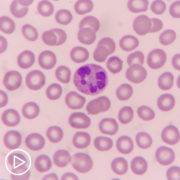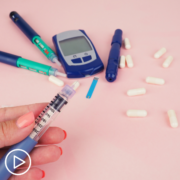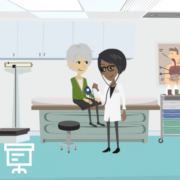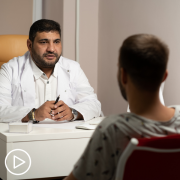How to Engage in Your MPN Treatment Decisions from Patient Empowerment Network on Vimeo.
How can myeloproliferative neoplasm (MPN) patients engage in their treatment decisions? Dr. Naveen Pemmaraju shares advice for taking a more active role to empower yourself to receive MPN care that’s best for you.
Dr. Naveen Pemmaraju is Director of the Blastic Plasmacytoid Dendritic Cell Neoplasm (BPDCN) Program in the Department of Leukemia at The University of Texas MD Anderson Cancer Center. Learn more about Dr. Pemmaraju, here.
See More from Engage
Related Programs:
Transcript:
Katherine Banwell:
Lately, we’ve been hearing this term “shared decision-making,” which basically means the patients and clinicians collaborate to make healthcare decisions. And it can help patients to take a more active role in their care. So, I’d like to get your thoughts on how best to make this process work.
Dr. Pemmaraju:
This is a passion area to me. I think this is so important that you bring this out. I think a generation or two ago, Katherine, it may have been common for there to be more of a one-way monologue, if you will, doctor to patient, and that may have been the majority of the conversation before.
I don’t see it that way anymore, and most of my colleagues don’t either. I think it should be a dialogue, as you said. It should be a back-and-forth communication, one that learns and evolves over time as any real relationship would, right? Outside in the real world. So, I think that’s important. Number two, I think trust needs to be earned, not just given.
So, that means patient and physician, and really the physician team – so, all the other members of the team – building that trust over time through frequent communication, visits, all of this. And then, finally, I think the key here is that a lot of patients always ask, “Hey, what can I do on my own?” I’ll tell you what you can do. You can be involved and read and empower yourself if you’re able to. If you’re able to and you can. Many may not be able to due to their illness or for other reasons.
But if you are able to, I think it’s great to read online. There, I just said it. Let me repeat it to make sure everyone heard that. I want you to read. I think it’s fine. Consult Dr. Google. What’s the worst that happens? The worst that happens is you find misinformation. Well, don’t keep it to yourself, right? So, Google, look up things, go to social media, see what experts in your area are talking about, go to Facebook, go to the patient groups. But remember, everyone’s case is different. Someone else’s is different from yours, and yours is different from the next. So, gather information like a sponge.
Formulate it, synthesize it in the way that only you know how to do, bring some notes, and then talk about it with me at the next visit, “Hey, I saw this on the Internet.” “Okay, great, let’s talk about that.” Or, “Hey, this new formulation of interferon is coming.” “Great, let’s talk about it.” So, gather information, sort out signal from the noise with your healthcare team. Sort that out and then move on, move on, move on. So, I think these are some of the aspects of what’s called shared decision-making. No longer a monologue, one-way street. Let’s have a dialogue, let’s have a partnership, let’s figure out a way to empower each other in this journey.
I’m a big fan of patients being empowered to ask anything that comes to mind. And again, that’s why I love this discussion because maybe there might be some people out there who are shocked, frankly, at what we’re talking about here. I think it’s great to do what you said. Yes. I think do your research, online or otherwise. Come up with a list of questions. Bring – if you’re able to, of course. If you have the ability to, bring one person with you. Or nowadays, on the telehealth, we put one person on through the phone during the pandemic time.
And then – yeah. I mean, yeah, sure, just you hear about something, ask about it. The worst thing that your doctor says is, “Hey, that’s only a research test. That’s not available.” It doesn’t hurt to ask. And it may help to lead to other discussions. I think it’s also a good idea to get a second or a third opinion if you need to. There, I said it. It’s your body, it’s your life, it’s your choice. I think, yes, advocate for yourself, because at the end of the day, who else is going to do that?



























